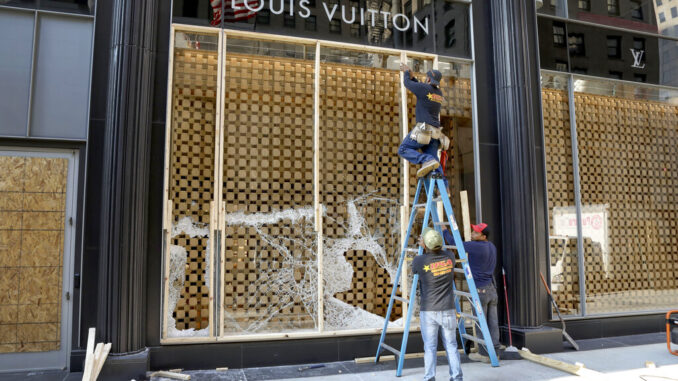
We’ve seen it happen all over America in recent years, with stores and restaurants packing up shop, some after decades of service to the community.
The primary reason for many of these closures has been escalating crime rates, and the frustration some retailers have with repeat offenders who are let off by soft-on-crime district attorneys, only to see the same people come back and victimize them again.
For instance, In-N-Out Burger recently announced its first store closure in the company’s history for its location in Oakland, California.
“Despite taking repeated steps to create safer conditions, our customers and associates are regularly victimized by car break-ins, property damage, theft, and armed robberies,” the fast food restaurant’s Chief Operating Officer, Denny Warnick, said in a statement last week on Twitter/X.
In a follow-up tweet, they shared a video of a smash-and-grab incident from 2023 as an example. “One of many occurrences,” they claimed.
In August, the San Francisco Chronicle reported that crime rates in Oakland had skyrocketed in 2023.
“As of early July, Oakland’s homicide count was up by 37% compared with 2019 and reported robberies were up by about 30%,” they noted.
“Property crime jumped too, particularly car-related crimes: Car break-ins were up by over 40%, while vehicle thefts had more than doubled,” they also reported.
Oakland jumped on the “Defund the Police” wave in 2020, slashing funding for their police department by $14.3 million. In 2021, it was cut by $17.4 million.
Sometimes when announcements about store closings are made, alarmed community leaders and residents take to the media to complain about it, alleging the CEOs of these businesses are putting profits over people.
Such a scenario is playing out in Boston, Massachusetts, where the fourth Beantown Walgreens in a little over a year will soon shut its doors permanently.
One person leading the charge to fight back against the closing of Roxbury location is Reverend Miniard Culpepper, who according to CBS News believes the decision by Walgreens to close the store, also located in a high-crime area, is “insensitive” and “unjust” considering the healthcare needs of the neighborhood’s aging population.
Self-described healthcare advocate Michael Curry, a former local NAACP leader in the area, told the news outlet that Walgreens should keep the store open as a service to residents even if they were losing money.
“What is your obligation? What is your expectation as a corporate citizen to do what’s right for those communities beyond what’s right just for your bottom line?’ he asked, according to the news outlet.
Activists in Boston have even vowed to visit Walgreens corporate headquarters in Chicago if they don’t get the response they want out of the Boston area corporate office.
Residents are directing their ire at the wrong people, though.
Electing the same people/political party over and over again and expecting a different result isn’t working. It is time frustrated citizens wake up and realize that fact.
Instead of blaming Walgreens for feeling like they have no option but to close stores in high-crime areas in big cities across America, maybe residents and other community leaders should take it up with the elected officials who they put into office in the first place, and let them know they will no longer accept the city’s (and state’s) soft-on-crime approach to combating lawlessness.
And then they need to turn around and elect people who have the backbone to actually do what needs to be done to combat the crime issues rather than coddle the offenders.
Until then, stores like Walgreens will have no choice but to make tough decisions about closures because at the end of the day, if a business is losing money and its employees and customers don’t feel safe, store owners/CEOs don’t have much of a choice other than to cut their losses and move on.
North Carolina native Stacey Matthews has also written under the pseudonym Sister Toldjah and is a media analyst and regular contributor to RedState and Legal Insurrection
